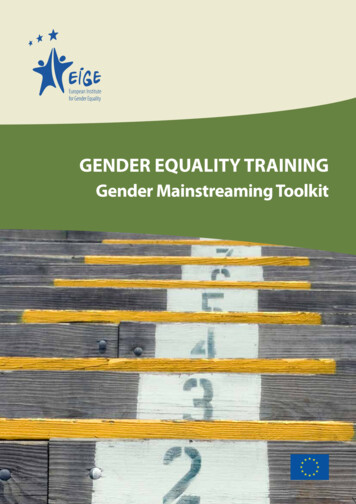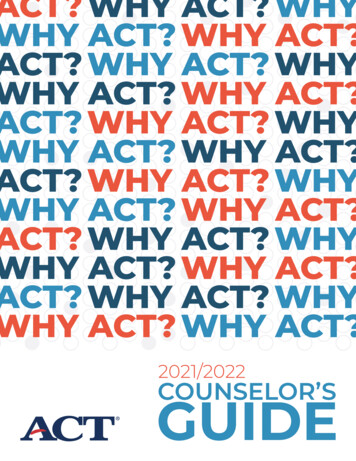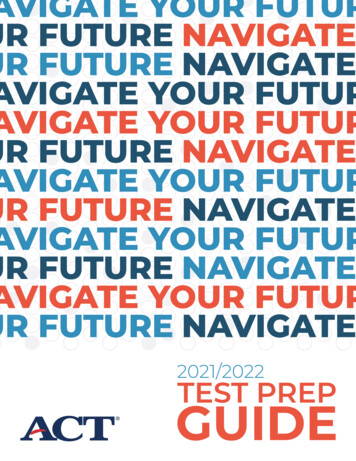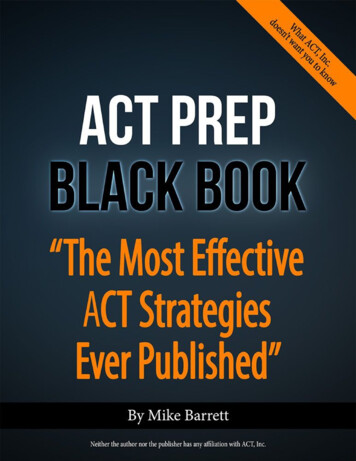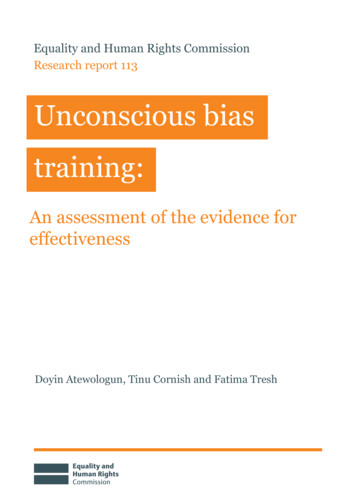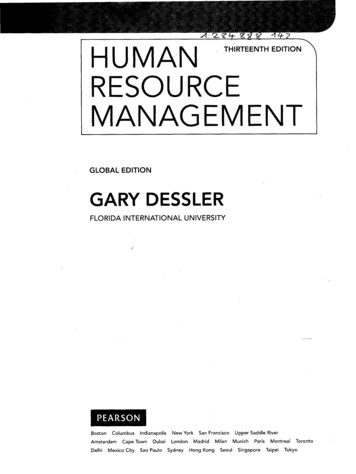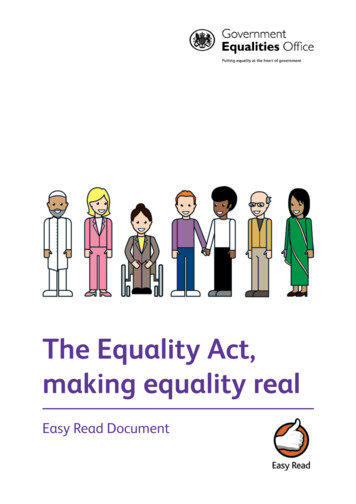
Transcription
The Equality Act,making equality realEasy Read Document
ImportantIn this easy read booklet we explain what some words mean.When we first mention any of these words, it is in bold green writing.A box then shows what the words mean.These words and what they mean are also in a Words List at the backof the booklet.If any of the words are used later in the booklet, we show them innormal green writing. If you see words in normal green writing, youcan look up what they mean in the Words List.The CDS Easy Read illustrations we develop are intended specifically for use in this publication.The Government Equalities Office has the right to share, send, print and distribute this productin its current format. The images within this product should not be copied from this documentand used for other purposes or passed on to a third party. Do not extract, modify, adapt, alter,or otherwise attempt to change the illustrations for other purposes without written permissionfrom CDS.CDS, 7 Eastgate, Leeds LS2 7LYTel: 0113 399 4000Web: www.cds.co.uk/clarity
Government Equalities Office The Equality Act, making equality realContentsWhat the Equality Minister says . . . . . . . . . . . . . . . . . . . . . . . . . . . . . . . . . 3The Equality Act . . . . . . . . . . . . . . . . . . . . . . . . . . . . . . . . . . . . . . . . . . . . . . . . . 5Who the Equality Act affects . . . . . . . . . . . . . . . . . . . . . . . . . . . . . . . 6When the Equality Act became law . . . . . . . . . . . . . . . . . . . . . . . . . 6What the Equality Act does . . . . . . . . . . . . . . . . . . . . . . . . . . . . . . . . . . . . . . 7Two new duties for public bodies . . . . . . . . . . . . . . . . . . . . . . . . . . 10Family background or where a person is born(the Socio-economic Duty) . . . . . . . . . . . . . . . . . . . . . . . . . . . . . . 10Treating people from different groups fairly and equally(the Equality Duty) . . . . . . . . . . . . . . . . . . . . . . . . . . . . . . . . . . . . . . 12Civil partnerships held in religious buildings . . . . . . . . . . . . . . 13Using buying power to make equality better . . . . . . . . . . . . . . 14More equality for people of different ages . . . . . . . . . . . . . . . . 15Equal pay and equality information . . . . . . . . . . . . . . . . . . . . . . . 17Using positive action to increase diversity . . . . . . . . . . . . . . . . . 18Positive action in elections for Parliament andlocal councils and diversity reporting . . . . . . . . . . . . . . . . . . . . . 20Extra powers for employment tribunals . . . . . . . . . . . . . . . . . . . 21New protection for people like carers . . . . . . . . . . . . . . . . . . . . . . 22A clear law for women breast-feeding babies . . . . . . . . . . . . . . 231
Government Equalities Office The Equality Act, making equality realTaking equality into clubs . . . . . . . . . . . . . . . . . . . . . . . . . . . . . . . . . 24Better protection for disabled people . . . . . . . . . . . . . . . . . . . . . . 25School pupils . . . . . . . . . . . . . . . . . . . . . . . . . . . . . . . . . . . . . . . . . . . 25Making the disability law clearer . . . . . . . . . . . . . . . . . . . . . . . . . 25Costs of reasonable adjustments . . . . . . . . . . . . . . . . . . . . . . . . 26Making information accessible for disabled people . . . . . . . 26Disabled people in buildings with shared areas . . . . . . . . . . . 26Treating disabled people poorly, without a good reason . . . 27Pre-employment disability-related enquiries . . . . . . . . . . . . . . 27Protecting people from dual discrimination . . . . . . . . . . . . . . 28Making Britain fair and equal for all . . . . . . . . . . . . . . . . . . . . . . . . . . . 29Words list . . . . . . . . . . . . . . . . . . . . . . . . . . . . . . . . . . . . . . . . . . . . . . . . . . . . . . 302
Government Equalities Office The Equality Act, making equality realWhat the Equality Minister saysMy name is Harriet Harman. I am the Minister for Women and Equality.Equality is a big part of my job and is very important to the Government.EqualityThis means everyone having the same chances to do what they can.Some people may need extra help to get the same chances.Equality is right for many reasons. People enjoy life more if they are treated fairly. The country is richer because each and every person can do whatthey are best at. It is easier for people to live side by side and get on with each otherif everyone is treated fairly.3
Government Equalities Office The Equality Act, making equality realA lot has been done to help make sure people are treated fairly. In the 1960s new laws said people of different races must betreated fairly.People of different racesThese are groups of people who come from different places, havedifferent skin colours or have passports from different countries. In the 1970s new laws said men and women must be treatedequally and get the same pay for the same job. In the 1990s new laws said disabled people must be treated fairly. In 2004 new laws gave lesbian, gay and bisexual people the rightto become partners, like married people.Lesbian, gay and bisexualLesbians are women who are attracted to other women.Gay men are attracted to other men.Bisexual people are attracted to women and to men.We wanted to bring these laws together so they are clear, strong andeasy to follow. This booklet tells you how we did this.Harriet Harman QC MPMinister for Women and Equality4
Government Equalities Office The Equality Act, making equality realThe Equality ActWe needed this Equality Act to make the equality laws clearer andstronger. You can find a list of the people who will be helped by thisAct on page 29.Equality Act or the ActThis is the Government’s new law to make sure all people are treatedfairly. The Act became law when Parliament agreed it was right.Stronger laws were needed because the old equality laws did notmake equality happen fast enough. For example many women are paid less than men for the same kind of work. clever children from poorer families do less well at school. disabled people are a lot more likely to have no job. people of different races find it harder to get a job. many lesbian and gay people are worried about asking the policefor help in case they are treated unfairly.5
Government Equalities Office The Equality Act, making equality real many people who have changed their sex do not use public serviceslike swimming pools because they think they will not be treated well.The Equality Act brings together 9 big equality laws and about 100smaller laws.Bringing these laws together makes it a lot easier for employers andother people to know what they must do. It will also help everyoneunderstand the law.EmployersThese are people or companies that pay people to do work.Who the Equality Act affectsThe Equality Act is for people in England, Scotland and Wales.When the Equality Act became lawThe Equality Act became law in Spring 2010, but it will not ‘startworking’ until later.6
Government Equalities Office The Equality Act, making equality realWhat the Equality Act doesThis list shows, in a few words, what the Equality Act does to make theequality laws stronger. To find out more, go to the page shown. The Act tells some public bodies to do 2 new things to help makeequality happen. See page 10.Public bodiesThese include government departments, schools, hospitals andcouncils. The Act will mean public bodies have to think about equality whenthey are buying things. See page 14. The Act has new rules to make sure older people are treated fairly.For example, some shops only help older people if they are with ayoung person. See page 15.7
Government Equalities Office The Equality Act, making equality real The Act has 2 new ideas to make men and women’s wages easier tocompare. See page 17. The Act allows employers to use positive action if they want tomake sure their workers are diverse. See page 18.Positive actionThis lets employers and service providers think about equalitywhen looking at who they might supply their services to or employ.It might mean providing services in a different way or givingpeople information or training. For employers it might meanchoosing between two people who can do the job as well aseach other.Diverse or diversityThis is a mix of different kinds of people. For example, menand women, young and old people, people of different races,disabled and non-disabled people. The Act lets employment tribunals do new things to help peopleget fair treatment. See page 21.8
Government Equalities Office The Equality Act, making equality realEmployment tribunalsThese sort out arguments between employers and workers. The Act protects people who are looking after someone, like carers,from being treated unfairly. See page 22.CarersCarers look after people who are too ill or disabled or old to lookafter themselves. The Act makes it clear that women can breast-feed their babies inshops, cafés and other places. See page 23. The Act makes sure clubs do not treat people unfairly. See page 24. The Act includes more to stop disabled people being treatedunfairly. See page 25.These changes and other things in the Act will make Great Britain abetter place to live and work, now and in the future.9
Government Equalities Office The Equality Act, making equality realTwo new duties for public bodiesThe Equality Act gives public bodies 2 new duties. Some public bodies will have to think about how they can helpto stop people doing less well than other people because of theirfamily background or where they were born. All public bodies must think about treating people from differentgroups fairly and equally.DutiesThese are things the law says someone must do.Family background or where a person is born(the Socio-economic Duty)Family background or where a person is born still affects their life. Forexample, a child from a rich family often does better at school thana child from a poor family, even if the poorer child is cleverer. This issometimes called socio-economic inequality.10
Government Equalities Office The Equality Act, making equality realThe Equality Act tells some public bodies that they will have to thinkabout what they can do to make their services more helpful to poorerpeople.How this might workA local council in charge of a town’s bus services checks to find out ifbuses meet the needs of local people. It finds that people in a poorpart of town have more trouble than other people getting to thelocal hospital. The council finds this was because of 3 things. There are only a few buses to the hospital each day. Most people do not have a car. It costs a lot to park cars at the hospital.The council works with the hospital to find ways to make it easier forpeople from the poorer parts of town to get to the hospital. Theydecide to pay for a free bus service from the town to the hospital.11
Government Equalities Office The Equality Act, making equality realTreating people from different groups fairly and equally(the Equality Duty)All public bodies must think about treating people from different groupsfairly and equally. This is called the Equality Duty.Equality DutyThis is a law for public bodies telling them they must think about howthey can make sure their work supports equality. For example, in theirservices, through their jobs, and through the money they spend.Public bodies already need to think about treating people of differentraces, disabled people, and men and women fairly and equally. TheAct adds extra groups of people to the Equality Duty. People of different ages – younger and older people. Lesbian, gay and bisexual people. The duty now fully covers people who have changed their sex or arein the process of doing so.12
Government Equalities Office The Equality Act, making equality real People with a religion or belief, or people without a religion or belief. Women having a baby, and women just after they have had a baby.How this might workFor older people, a local council might put extra seats in a park soolder people can enjoy the park as well as younger people.For lesbian, gay and bisexual people, a school might do more tomake sure lesbian, gay and bisexual children are not bullied.For people with a religion or belief, a local council’s meals on wheelsservice might cook different meals for people who need to eat specialfood because of their religion. For example, they might make specialmeals for Jewish people and special meals for Muslim people.Civil partnerships held in religious buildingsThe Act will let civil partnerships for gay and lesbian couples be held inreligious buildings.13
Government Equalities Office The Equality Act, making equality realUsing buying power to make equality betterPublic bodies spend over 220 billion pounds a year. That gives thema lot of buying power to tell companies they buy things from thatthey want them to include equality in the way they work.Buying powerThis is the effect buyers can have on companies they buy thingsfrom. Because public bodies buy a lot of things, they can encouragesuppliers to treat people fairly in the way they do their work.The Act enables the Government to tell some public bodies to thinkabout how they can do this.14
Government Equalities Office The Equality Act, making equality realMore equality for people of different agesIn the next 20 years there are going to be a lot more older people. Weneed to make sure they are treated fairly and are not told they are tooold to do the things they want to do.The law already said employers cannot say someone is too old or tooyoung for a job. But older people still say they get treated unfairly inother ways that did not break the law. For example some shops only help older people if they are with a young person.They think older people cannot understand about new things likemobile phones. some companies make older people pay more than younger peoplefor a service, without having a good reason. some older people do not get the same health and care servicesthat younger people get.The Equality Act includes changes to the law to stop these thingshappening to people of different ages (aged 18 or over).15
Government Equalities Office The Equality Act, making equality realHow this might workHere are some examples of how things might change for olderpeople because of the Equality Act. Older people paying the same as younger people for services,unless the company has good reasons for asking for more money. Older people getting the same care in hospital as younger people.But the Equality Act will not change things that are good for peopleof different ages, like free bus passes and flu injections for olderpeople or travel passes for students.16
Government Equalities Office The Equality Act, making equality realEqual pay and equality information40 years ago a new equal pay law told employers that men andwomen should get equal pay for doing the same sort of work, butmany men still get more wages than women.Equal pay lawThis is a law that tells employers that men and women must get thesame pay for doing the same work.To put this right we need to know where it is happening. So theEquality Act includes 2 new ideas to help make equal pay happen. If a company has 250 or more workers, it may have to publishinformation about differences in men and women’s pay. The Act also enables the Government to tell public bodies topublish information about equal pay and how many workers it haswho are disabled or people of different races. The Governmentplans to do this for public bodies with 150 or more workers.The Act also stops employers telling workers they must not talk toeach other about how much they get paid.17
Government Equalities Office The Equality Act, making equality realUsing positive action to increase diversityEven when people of different races and women do well at schooland college, they do not get their fair share of the top jobs. Forexample only 15 Members of Parliament are people of different races.Looking at the diversity of this country, there should be 60. only 3 top judges are people of different races. fewer than 1 in every 6 top people in universities is a woman. To befair, 3 out of every 6 should be women. only 1 out of every 10 top people in big companies is a woman.The law already lets employers do some kinds of positive action. Job adverts can be aimed at people of different races, women orsome other groups if an employer wants to make their workforcemore diverse because they do not have any, or enough, people fromthose groups.18
Government Equalities Office The Equality Act, making equality real Employers can train women, people of different races or peoplefrom some other groups to give them more chance of getting abetter job with the employer. They can only do this when they have,for example, too few people who are black or too few women.The Act makes it easier for employers to use positive action and it letsthem choose a person who will make their workers more diverse, whenchoosing between people who are right for the job.ExampleA company needs a new person for 1 of its top jobs. All its other topjobs are done by men. When people apply for the job, the companyfinds 2 people are just right for the job – a woman and a man.The company can use positive action to give the job to the woman.This is because it will make the company’s top people more diverse.But the company cannot give the job to the woman if the man isbetter for the job.19
Government Equalities Office The Equality Act, making equality realPositive action in elections for Parliament and local councilsand diversity reportingIt is important that the people in Parliament and on local councils are asdiverse as all the people in the country. That is not happening yet.It is already possible for political parties to choose only women forelections in some areas. The Act will let political parties have thesewomen-only lists until 2030.ElectionThis is when everyone over 18 can vote for the person they want to betheir Member of Parliament or their local councillor.The Equality Act also lets political groups help some people likepeople of different races and lesbian, gay and bisexual people have achance to get elected. The Act also lets the Government make politicalparties publish information on the diversity of their candidates.20
Government Equalities Office The Equality Act, making equality realExtra powers for employment tribunalsEmployment tribunals can suggest how an employer can put thingsright for a worker if they were treated unfairly. But most of the timethis does not help the employer’s other workers, because most peoplewho complain to employment tribunals have stopped working for theemployer.The Equality Act allows the employment tribunal to tell the employertheir advice should apply to all their workers, even when the one whocomplained doesn’t work there any more.ExampleA woman complains because she says her employer has treated herunfairly because she is a woman. The employment tribunal agrees,but the woman has stopped working for the employer.The employment tribunal can tell the employer how to change theway they do things so their other women workers are treated fairlyin future.21
Government Equalities Office The Equality Act, making equality realNew protection for people like carersWe already have laws to protect many groups of people from beingtreated unfairly – for example because they are people of different races. because they are lesbian, gay or bisexual people.But those laws did not always protect carers looking after someonethe law protects.Under the Equality Act, carers of disabled and older people getprotection.ExampleA company is looking for staff. A woman, who has a disableddaughter, applies for a job. The company must not turn her down justbecause they think she will take too much time off work to care forher daughter.22
Government Equalities Office The Equality Act, making equality realA clear law for women breast-feeding babiesThe Government supports women who want to breast-feed their baby.But many women do not know what their rights are. As a result, manywoman do not breast-feed their babies in shops, cafés and otherpublic places, in case the owner asks them to leave.So the Equality Act makes it clear that it is against the law to stop awoman breast-feeding her baby in places like coffee shops, buses, andrestaurants , or to ask her to leave.ExampleA bus driver cannot ask a woman to get off the bus just because sheis breast-feeding her baby.23
Government Equalities Office The Equality Act, making equality realTaking equality into clubsThe Equality Act does make it against the law for clubs which are foreveryone to treat some members and guests unfairly. We know thatit is good for some groups of people to have their own places wherethey can meet and enjoy themselves. That is why the Equality Act doesnot stop women-only and men-only clubs, or clubs for people whoshare a characteristic like their age or their religion or belief, like anover-60s club.ExamplesA golf club with men and women members cannot let men play atany time while women can only play in the mornings.A club that lets members bring their partners cannot say disabledpartners are not allowed. If the building is difficult for disabled peopleto use, the club must make fair changes so disabled people can use it.24
Government Equalities Office The Equality Act, making equality realBetter protection for disabled peopleThe Equality Act has several new rules to protect disabled people better.School pupilsIf a school pupil needs special equipment or help because oftheir disability the school must provide it if it would not be toomuch trouble.Making the disability law clearerThe Equality Act makes the law on reasonable adjustments clearer.Reasonable adjustmentsThese are changes an employer or someone providing a service hasto make so that disabled people can do something, like getting into ashop to do their shopping or a council or bank sending information inthe best way for them to use, like in large print or in easy to read words.25
Government Equalities Office The Equality Act, making equality realCosts of reasonable adjustmentsSometimes when an employer or someone providing a service makesa reasonable adjustment so that a disabled person can do somethingit will cost them extra money. The Equality Act says that most of thetime they can’t expect the disabled person to pay them that extramoney back.Making information accessible for disabled peopleDisabled people need to be able to understand the information theyare sent by people like their council or their bank so that they knowwhat to do. This is a reasonable adjustment.Disabled people in buildings with shared areasIf a disabled person lives in a building with shared areas – like stairsand hallways – the disabled person can ask the landlord to make anyfair changes so the disabled person can use them. The disabled personwould have to pay for the changes.26
Government Equalities Office The Equality Act, making equality realTreating disabled people poorly, without a good reasonA court decision has made it harder for disabled people to show theyhave been treated poorly because their disability makes them dosomething. The Government has used the Equality Act to make iteasier for disabled people to get their rights again.ExampleA man’s disability makes him mumble his words. He is thrown out ofa pub because the owner thinks he is drunk. The owner breaks the lawif he knew the man is disabled, and has no good reason to ask him toleave.Pre-employment disability-related enquiriesWhen a person applies for a job the employer can ask if the personis disabled, and if they say they are disabled the employer might notgive them the job. This is unfair.The Equality Act will make it harder for an employer to be unfairbecause it says they can only sometimes ask if a person is disabled. Forexample, an employer might need to know if a person is disabled sothey can make changes to a test or a job interview.27
Government Equalities Office The Equality Act, making equality realProtecting people from dual discriminationDual discrimination is when someone is treated worse than otherpeople because of a combination of two things. if they are a woman or a man. if they are transsexual. if the have a disability. if they are straight, lesbian, gay or bisexual. their age. their race. their religion or belief.The Act makes dual discrimination against the law.ExampleMary works for an employer who treats black men and white womenfairly but treats Mary worse because she is a black woman. Mary isdiscriminated against because of the combination of being a womanand black. This is dual discrimination and the Act protects Mary.28
Government Equalities Office The Equality Act, making equality realMaking Britain fair and equal for allThis booklet has shown how the Equality Act helps many of thedifferent groups of people in England, Scotland and Wales whosometimes get treated unfairly. Women and men. People of different races. Disabled people. People with different religions or beliefs or with no religion or belief. People of different ages. Lesbian, gay and bisexual and straight people. People who have changed their sex.The Equality Act and the many other kinds of equality work theGovernment is doing will make Britain a more fair and equal place foreveryone.29
Government Equalities Office The Equality Act, making equality realWords listBuying powerThis is the effect buyers can have on companies they buy thingsfrom. Because public bodies buy a lot of things, they can encouragesuppliers to include equality in the way they do their work. 14CarersCarers look after people who are too ill or disabled or old tolook after themselves.9Diverse or diversityThis is a mix of different kinds of people. For example, menand women, young and old people, people of different races,disabled and non-disabled people.8DutiesThese are things the law says a public body must do. 10ElectionThis is when everyone over 18 can vote for the person they want tobe their Member of Parliament or their local councillor. 20EmployersThese are people or companies that pay people to do work.630
Government Equalities Office The Equality Act, making equality realEmployment tribunalsThese sort out arguments between employers and workers.9EqualityThis means everyone having the same chances to do what theycan. Some people may need extra help to get the same chances.3Equality Act or the ActThis is the Government’s new law to make sure all peopleare treated fairly.5Equality DutyThis is a law for public bodies telling them they must think about howthey can make sure their work supports equality. For example, in theirservices, through their jobs, and through the money they spend.Public bodies already needed to think about treating people ofdifferent races, disabled people, and men and womenfairly and equally. 12Equal pay lawThis is a law that tells employers that men and women mustget the same pay for doing the same work. 1731
Government Equalities Office The Equality Act, making equality realLesbian, gay and bisexualLesbians are women who are attracted to other women.Gay men are attracted to other men.Bisexual people are attracted to women and to men.4People of different racesThese are groups of people who come from different places, havedifferent skin colours or have passports from different countries.4Positive actionThis lets employers and service providers think about equalitywhen looking at who they might supply their services to or employ.It might mean providing special services or giving peopleinformation or training. For employers it might mean choosingbetween two people who can do the job as well as each other.8Public bodiesPublic bodies include government departments, schools,hospitals and councils.7Reasonable adjustmentsThese are changes an employer or someone providing a servicehas to make so that disabled people can do something, like gettinginto a shop to do their shopping or a council or bank sendinginformation in the best way for them to use, like in large printor in easy to read words. 2532
Government Equalities Office The Equality Act, making equality realNotes33
Government Equalities Office The Equality Act, making equality realNotes34
How to contact es.gov.ukLettersGovernment Equalities Office9th FloorEland HouseBressenden PlaceLondonSW1E 5DUDesigned and produced by CDS www.cds.co.uk/clarity
This list shows, in a few words, what the Equality Act does to make the equality laws stronger. To find out more, go to the page shown. The Act tells some public bodies to do 2 new things to help make equality happen. See page 10. Public bodies These include
